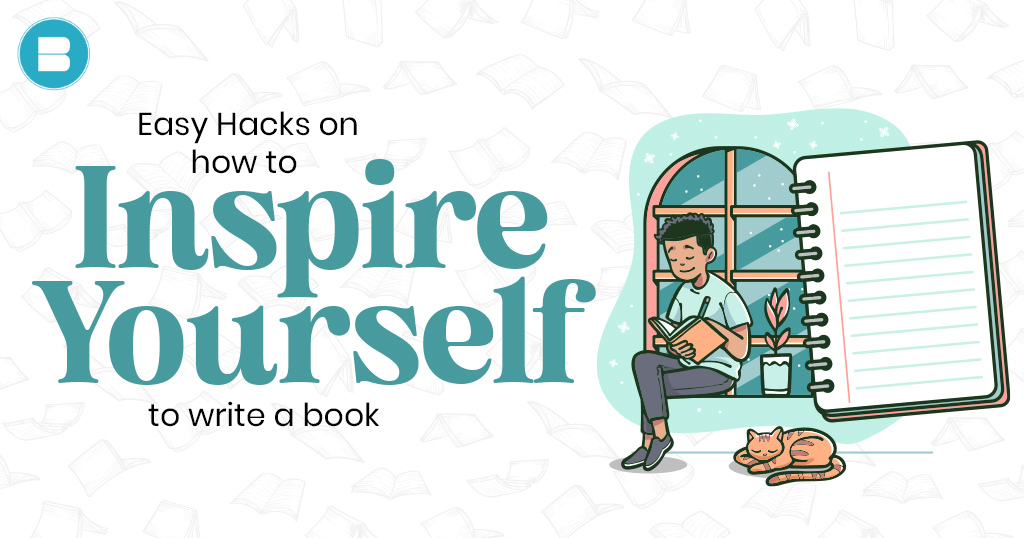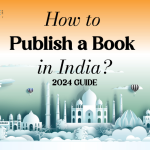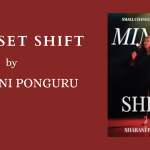Writing a book is like embarking on an epic journey. It’s an endeavour that demands dedication, creativity, and unwavering motivation. Yet, even the most passionate writers encounter moments when their inspiration wanes and the blank page seems more daunting than ever. If you find yourself in such a predicament, fear not!
Read: Everything to know about Memoir: Definition, Examples & Types
In this blog, we’ll explore easy hacks to reignite your inspiration and propel you towards writing that book you’ve always dreamed of.
- Find Your Writing Ritual
- Set achievable goals
- Explore different writing styles
- Connect with fellow writers
- Read Widely
- Embrace Writer’s Prompts
- Find inspiration in everyday life
- Create compelling characters
- Read about other authors’ journeys
- Free write to Release Your Creativity
- Visualise your finished book
- Learn from Your Writing Slumps
- Seek Feedback
- Commit to writing regularly
- Stay curious and open-minded
- Find Your Writing Ritual:
Creating a writing routine is a powerful strategy for cultivating a productive and creative writing attitude. It simply entails developing a regular set of acts or habits that work as triggers for your brain to switch into writing mode.
Before you begin writing, consider burning a fragrant candle, listening to relaxing background music, or making your favourite cup of tea. These behaviours contribute to the creation of a sensory and psychological environment favourable to creativity. Your brain creates links between these rituals and the act of writing over time, making it simpler to enter the creative zone anytime you participate in them.
The value of a writing routine resides in its capacity to notify your brain that it is time to focus, helping you to overcome distractions and procrastination. It may be as complicated or as basic as you choose, suited to your own preferences and needs. Whether it’s the perfume of the candle, the soothing strains of music, or the comfort of your tea, your ritual becomes a customised entryway to effective writing sessions.
Finding your writing routine is ultimately about developing a ritual that resonates with you, assisting you in transitioning from the bustle of daily life into the tranquil place of creation, one step at a time. - Set Achievable Goals:
Writing a book may be an enormously difficult task. The sheer amount of words necessary might make the work appear overwhelming, resulting in writer’s block and demotivation. To overcome this obstacle, divide your writing journey into smaller, more manageable tasks.
Instead of focusing exclusively on finishing a book, create daily or weekly word count goals. Given your schedule and writing rate, these goals should be reasonable and doable. By breaking down the overall objective into smaller milestones, you may feel progress and success with each step you take.
It is critical to recognise and celebrate tiny accomplishments. When you meet a word count target or finish a chapter, reward yourself in a way that supports your drive. It might be as easy as eating your favourite snack, going for a brief stroll, or engaging in a leisure activity you like. These incentives give positive reinforcement, making you more likely to adhere to your writing schedule.
Setting reasonable objectives and praising your accomplishments can help you maintain momentum and motivation throughout your writing journey. The process gets less scary, and you’ll find yourself getting closer to your ultimate objective of finishing your book. Remember that persistence and commitment are essential to making your writing ambitions a reality. - Explore Different Writing Styles:
For any writer, experimenting with different writing styles and genres may be a freeing and gratifying experience. Often, authors feel stuck or lack inspiration, which is when experimenting with different types of writing comes into play.
Writing forms that vary, such as poetry, short tales, essays, and journaling, allow writers to expand their creative horizons. Each style provides a distinct means of expressing thoughts, emotions, and storylines. Stepping beyond your comfort zone and exploring these many forms allows you to obtain a broader view of your own writing ability.
For example, if you’re typically a fiction writer, attempting poetry can help you delve deeper into the beauty of language and images. Writing essays can help you improve your arguments and critical thinking abilities. Journaling may be a personal avenue for self-discovery and introspection.
Experimentation frequently leads to writer development and progress. It motivates you to break out of your routine and be creative. Furthermore, experimenting with different writing styles might reveal hidden abilities and hobbies you were unaware of. So, instead of limiting yourself, embrace the enormous array of writing opportunities to revitalise your creativity. - Connect with Fellow Writers:
Writing might be a solitary activity, but that doesn’t mean you should withdraw. Joining writing organisations or communities, whether in person or online, can be a great source of inspiration and encouragement.
Fellow authors understand the difficulties, doubts, and successes that come with the job. They may give constructive input, encourage you through difficult times, and celebrate your accomplishments. Sharing your writing journey with individuals who are as enthusiastic about the written word as you are can be both encouraging and comforting.
These relationships can also lead to chances for cooperation and networking. You may meet co-writers for projects, hear about writing contests or publication possibilities, or simply participate in engaging discussions that generate new ideas.
Seeing the work and accomplishments of other writers may also be motivating. It’s a reminder that you’re not alone in your creative struggles and that success is attainable with dedication and support. So, reach out to fellow writers, exchange experiences, and create a sense of camaraderie within the writing community. - Read Widely:
Reading is essential to writing. The more you read, the more you are exposed to a diverse range of writing styles, opinions, and ideas. Reading widely is like gasoline for your imagination, and it is crucial to developing your own distinct voice as a writer.
Immersion in many genres, writers, and literary traditions teaches you varied storytelling approaches, narrative structures, and language subtleties. This exposure allows you to gain a greater respect for the craft of writing while also providing new insights into your own work.
Reading beyond your favourite genre might be especially illuminating. It exposes you to new narrative standards and encourages you to adapt and experiment with your writing. For example, if you typically write fantasy, you might want to look into non-fiction or literary fiction, which can inspire you to incorporate elements of realism or social commentary into your storytelling.
Additionally, reading offers a wellspring of inspiration. A single sentence, a vivid description, or a compelling character in a book can spark your imagination and set your creativity in motion. So, make reading a consistent part of your writing journey, and you’ll find that your writing flourishes with newfound depth and originality. - Embrace Writer’s Prompts:
Writer’s prompts are invaluable tools for overcoming writer’s block and invigorating your creativity. These prompts provide a starting point, a theme, or a seed of inspiration to kickstart your writing when you’re feeling stuck or uninspired.
Prompts can take various forms, including a single word, a sentence, a picture, or a scenario. They are designed to nudge your imagination and lead you down unexpected and exciting paths. Embracing prompts encourages you to think outside the box and explore uncharted territories in your writing.
For instance, a prompt like “Write about an encounter with a mysterious stranger in a bustling city” can transport you into a world of intrigue and suspense. It compels you to craft a narrative around this concept, infusing your creativity with fresh energy.
Prompts are also a fantastic way to experiment with different genres or writing styles. They allow you to tackle themes or subjects you might not have explored otherwise. Whether you use prompts as warm-up exercises or as the foundation for longer work, they are an excellent tool for keeping your creative juices flowing and breaking through creative barriers. - Find Inspiration in Everyday Life:
Inspiration isn’t necessarily elusive or great; it may also be found in the mundane moments of your everyday life. Pay attention to the world around you to build this awareness. Engage in discussions, study people, and be sensitive to the nuances of your environment. You could be astonished by the amount of inspiration hidden in seemingly innocuous meetings.
Consider how a random encounter with a stranger may create a story idea or how seeing weird activity in a park could lead to character development. Everyday life is brimming with material for writers to mine; all it needs is a keen eye and an attentive ear.
Furthermore, your dreams might serve as a source of inspiration. Keep a dream notebook by your bed to record the vivid tales that occur in your subconscious during sleep. These dreamscapes often contain elements that can be woven into your stories, adding layers of depth and intrigue.
By embracing the art of observation and introspection, you open the door to a continuous flow of inspiration from the world around you. It transforms the ordinary into the extraordinary, making your writing resonate with authenticity and relatability. - Create Compelling Characters:
Characters are the beating heart of any compelling story. When you invest time in crafting well-rounded, authentic characters, they can take on a life of their own and steer your narrative in unexpected, inspiring directions.
Start by delving into your characters’ personalities, quirks, fears, and desires. What motivates them? What secrets do they harbor? By knowing your characters intimately, you empower them to influence the story organically.
As you write, let your characters guide you. Imagine how they would react to different situations, decisions, and conflicts. Their unique perspectives and complexities can lead to surprising plot twists and thematic depth.
For example, if you’ve created a character with a deep-seated fear of water, this phobia might evolve into a central theme or plot point as the story progresses. It could lead to scenes involving a challenging river crossing or a climactic water-based showdown.
Characters with well-developed backstories and genuine emotions resonate with readers and elevate your storytelling. By placing these characters at the forefront of your creative process, you not only breathe life into your narrative but also find inspiration in the ever-evolving personas you’ve created. - Read About Other Authors’ Journeys:
Writing can be a lonely and challenging endeavour, and it’s easy to feel discouraged when faced with rejection or obstacles. However, learning about the journeys of other authors, especially those who have faced adversity before achieving success, can be both motivating and comforting.
Many renowned authors, from J.K. Rowling to Stephen King, experienced multiple rejections and setbacks before their breakthroughs. Understanding that even the literary giants faced struggles and moments of self-doubt can reignite your determination and resilience.
Reading about these authors’ perseverance can serve as a reminder that the path to becoming a successful writer is often fraught with hurdles. Yet, it’s precisely these challenges that shape your growth as a writer.
By immersing yourself in the stories of others who have walked the same path, you gain insights into coping strategies, creative processes, and the tenacity required to succeed. You’ll find solace in knowing that your struggles are part of a larger narrative shared by countless writers throughout history. - Free write to Release Your Creativity:
Freewriting is a liberating exercise that allows you to bypass the constraints of structure and purpose. It involves setting aside dedicated time to write without any specific goal or plan. During this practice, your primary aim is to let your thoughts flow freely onto the page.
Freewriting is a powerful tool for unlocking creativity because it encourages you to silence your inner critic and embrace spontaneity. It’s about giving yourself permission to write without judgement or expectation. In doing so, you can tap into ideas and emotions that might have remained buried beneath conscious thought.
This unstructured writing can serve various purposes. It can help you overcome writer’s block by providing an outlet for unfocused ideas. It can lead to surprising breakthroughs as you stumble upon unexpected connections or insights. Freewriting can also serve as a warm-up exercise, preparing your mind for more structured writing sessions.
The absence of rules or constraints during freewriting liberates your creativity and invites experimentation. You might explore themes or ideas you wouldn’t have considered within a traditional framework. In essence, it’s a journey into the uncharted territory of your mind, where inspiration often resides, waiting to be discovered. - Visualise your Finished Book:
Visualisation is a powerful technique to harness the law of attraction and bring your writing aspirations closer to reality. Close your eyes and mentally picture yourself holding a physical copy of your finished book. Imagine the cover design, the texture of the pages, and the words you’ve meticulously crafted. This exercise not only motivates you but also programmes your subconscious mind to work towards your goal.
For instance, if you’re writing a novel set in a lush forest, visualise the cover featuring a mesmerising woodland scene. Imagine the scent of the paper as you flip through the pages, immersing yourself in your story’s world. This mental imagery not only fuels your determination but also makes the creative process feel more tangible. - Learn from Your Writing Slumps:
Writer’s block and slumps are common hurdles that every writer encounters at some point. Instead of viewing them as insurmountable obstacles, consider them valuable opportunities for growth. These challenging periods often precede breakthroughs in your writing journey.
Take the time to reflect on what might be causing your creative block. Is it a lack of inspiration, self-doubt, or external distractions? Once you identify the root cause, you can develop strategies to address it.
For instance, if you’re struggling to develop a character, use this slump as a chance to explore their backstory or motivations in greater depth. Embrace the challenge, and you might discover unexpected facets of your character that enrich your narrative.
Remember that writers’ slumps are temporary, and they often pave the way for periods of heightened creativity and productivity. By pushing through these moments of stagnation, you emerge as a more resilient and resourceful writer. - Seek Feedback:
Sharing your work with others and actively seeking feedback can be a game-changer in your writing journey. Constructive criticism provides invaluable insights that can help you refine your writing skills and stay motivated.
For example, let’s say you’ve written the opening chapters of your novel and shared them with a writing group. A fellow writer points out that your pacing could be improved by adding more tension in the opening scene. This feedback not only guides your revisions but also fuels your determination to enhance your storytelling.
Moreover, sharing your work with a trusted beta reader or mentor can offer fresh perspectives and encouragement. Positive feedback reinforces your belief in your writing abilities, while constructive criticism propels you towards improvement. It’s a symbiotic relationship that keeps you motivated and committed to your writing goals. - Commit to Writing Regularly:
Consistency is the bedrock of successful writing. Dedicate a specific time each day or week to write, and stick to your schedule religiously. Whether it’s a daily hour of morning writing or a weekly Saturday afternoon session, regularity is key.
Consider this scenario: You commit to writing 500 words every morning before starting your day. Over time, this disciplined approach results in a manuscript of considerable length. The cumulative effect of daily writing sessions helps maintain your momentum and ensures steady progress towards your book’s completion.
Regular writing sessions not only improve your writing skills but also condition your mind to associate that specific time with creativity. It becomes a habit, and your brain becomes more receptive to inspiration during these designated periods. - Stay Curious and Open-minded.
A curious and open-minded approach is fundamental to staying inspired as a writer. Explore new interests, ideas, and perspectives to keep your creative wellspring flowing.
For instance, if you primarily write historical fiction, don’t hesitate to delve into science fiction or fantasy. The cross-pollination of genres can lead to unique story concepts and fresh writing styles. Your openness to new genres might lead to an unexpected source of inspiration for your next book.
Moreover, engage with the world around you with a curious eye. Attend lectures, travel to new places, or read about topics outside your comfort zone. These experiences can introduce you to unexplored themes and narratives that ignite your creative spark.
An open-minded approach also extends to your characters and plotlines. Be receptive to the diverse personalities and stories that populate your imagination. This receptiveness can result in characters with multifaceted backgrounds and narratives that resonate with a broader readership.
Read: Publish Mystery Romance Novels: A Complete Fiction Genre Guide
To recap, publishing a book is a great accomplishment that requires dedication and imagination. While uncertainty and writer’s block are prevalent, these simple tricks can help spark your creativity and bring you closer to your writing objectives. Remember that every writer’s path is unique, and what works best for you may differ from what works best for others. Continue to be enthusiastic, driven, and to write; the world is waiting for your narrative.
















